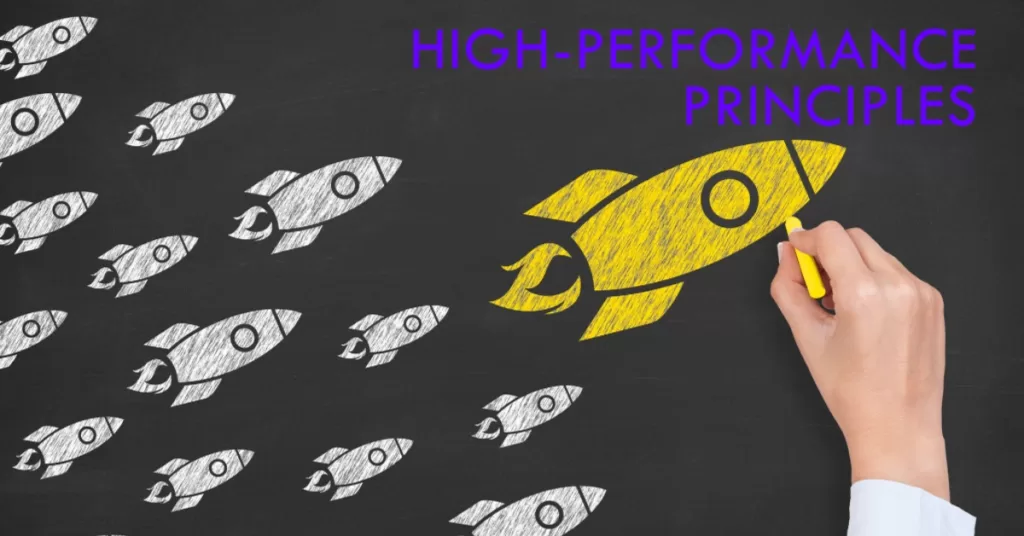Coaching has become a popular practice in organizations as it enhances performance, motivation, and employee engagement. High-performance coaching principles are aimed at improving individual and team performance by identifying strengths, weaknesses, and areas of improvement. It involves developing an action plan to achieve specific goals through effective communication, self-awareness, emotional intelligence, growth mindset, resilience-building, continuous learning, and development.
The success of high-performance coaching is dependent on the coach’s ability to establish rapport with the coachee by building trust and providing constructive feedback. The coach must also have excellent listening skills to understand the coachee’s needs and tailor solutions that align with organizational objectives. This article explores various high-performance coaching principles that coaches can use to enhance performance among individuals or teams in different contexts.
Key Takeaways
- High-performance coaching aims to improve individual and team performance by identifying strengths, weaknesses, and areas of improvement and developing action plans to achieve specific goals.
- Effective communication, self-awareness, emotional intelligence, growth mindset, resilience-building, and continuous learning are essential components of high-performance coaching.
- Setting clear and achievable goals that align with personal values, breaking down bigger objectives into smaller milestones, and providing constructive feedback is important for achieving success in coaching endeavors.
- Measuring and evaluating performance through feedback surveys, peer reviews, and establishing clear objectives and KPIs can help individuals identify areas for improvement and pursue continuous learning and development opportunities.
Understanding the Importance of Self-Awareness
An essential component of high-performance coaching principles is the understanding and appreciation of self-awareness. It enables individuals to identify their strengths, weaknesses, emotions, and behaviors in a non-judgmental manner. Self-awareness allows coaches to understand how their clients perceive themselves and the world around them. This knowledge helps coaches tailor their approach to each client’s unique needs.
Self-awareness is crucial because it allows individuals to take control of their lives. When people are self-aware, they can identify what motivates them and what holds them back. They can recognize patterns in their behavior that may be hindering their progress toward achieving goals. By increasing self-awareness, individuals become more empowered to make conscious decisions that align with their values and life purpose.
Self-awareness also promotes emotional intelligence. Coaches who understand the importance of emotional intelligence can help clients better manage stressful situations by recognizing and regulating emotions effectively. Emotionally intelligent individuals are also better equipped to handle interpersonal relationships because they have a greater understanding of others’ perspectives.
Ultimately, self-awareness leads to personal growth and development. High-performance coaches help clients develop strategies for increasing self-awareness so they can achieve success in all areas of life – from career advancement to personal relationships. By cultivating a deeper understanding of themselves, individuals become more resilient in the face of adversity and more confident in pursuing their dreams.
Setting Clear and Achievable Goals
To effectively guide individuals toward success, it is essential for coaches to establish objectives that are both unambiguous and realistic. Setting clear and achievable goals can motivate individuals to achieve their fullest potential. Goals provide direction, focus, and purpose while enabling individuals to measure their progress toward success. Clear goals help people stay on track and make necessary adjustments along the way.
When setting goals, it is important to take into account an individual’s unique strengths and weaknesses. Coaches must work with their clients to set goals that align with their personal values, beliefs, and aspirations. By doing so, they create a sense of ownership in the goal-setting process which increases motivation levels. The more invested someone is in achieving a particular goal, the more likely they are to succeed.
Setting achievable goals involves breaking down bigger objectives into smaller milestones or targets. This approach helps individuals avoid feeling overwhelmed by large-scale objectives while providing them with a sense of accomplishment as they move closer to the ultimate goal. Additionally, it allows coaches to monitor progress more effectively while making any necessary modifications along the way.
Setting clear and achievable goals is an essential component of high-performance coaching principles. Not only do well-defined objectives provide direction and focus but also increase motivation levels as individuals strive toward achieving success in various aspects of life. To ensure optimal results, coaches must work collaboratively with clients when establishing objectives that align with personal values while taking into account individual strengths and weaknesses. Ultimately, this approach promotes self-awareness while creating a roadmap for success through which everyone can flourish emotionally and psychologically.
The following table will help you visualize the role of self-awareness and emotional intelligence when setting goals and taking action. It represents specific emotions, associated feelings, and related example goals.
| Emotion | Feeling | Goal |
|---|---|---|
| Joy | Ecstatic | Start my own business |
| Fear | Terrified | Skydiving |
| Pride | Accomplished | Run a marathon |
| Love | Grateful | Volunteer at a local shelter |
| Anger | Frustrated | Learn healthy ways to communicate and manage my emotions |
Developing Effective Communication Skills
Effective communication is one of the key interpersonal skills essential for achieving high levels of performance. It is crucial for achieving success in both personal and professional relationships. Developing effective communication skills requires consistent practice, patience, and an understanding of the principles that make up good communication. Effective communicators understand how to listen actively and provide feedback in a constructive manner.
One key principle of effective communication is the ability to listen actively. Active listening involves paying attention to what someone else is saying without interrupting or judging them. This allows people to feel heard and understood, which can foster better relationships. To become an active listener, it’s important to focus on the speaker, ask clarifying questions if necessary, and avoid distractions.
Another important aspect of effective communication is providing feedback in a constructive manner. Feedback can be a powerful tool for improving performance or behavior but delivering it poorly can damage relationships. Constructive feedback should be specific, time-bound, and focused on behaviors rather than personalities. The goal of feedback should be to help the recipient improve their performance or behavior rather than criticize them.
Clear and concise messaging is essential for good communication. Effective communicators know how to express their thoughts clearly and concisely so that they are easily understood by others. They avoid jargon or technical terms that may not be familiar to everyone in the conversation; instead using simple language that all parties can understand.
To conclude, developing effective communication skills requires consistent practice and understanding of key principles such as active listening, constructive feedback delivery, and clear messaging. Good communication fosters better relationships both personally and professionally leading to successful outcomes in various areas of life including coaching.
Enhancing Emotional Intelligence
Enhancing emotional intelligence involves developing a better understanding of one’s own emotions and the emotions of others to effectively manage interpersonal relationships. The ability to recognize, understand, and regulate emotions is essential for high-performance coaching. Emotional intelligence is not an innate trait; it can be learned and developed through practice.
To enhance emotional intelligence, coaches need to focus on self-awareness by identifying their own emotions and how they impact their behavior. Coaches must also develop empathy by understanding the perspectives of others, including clients, colleagues, and stakeholders. By being empathetic toward others’ feelings, coaches can create a positive environment that fosters trust and mutual respect.
Another critical aspect of enhancing emotional intelligence is developing effective communication skills. Coaches must learn to communicate clearly and concisely while using active listening techniques to understand their clients’ needs fully. They must also be able to provide constructive feedback in a manner that does not undermine the client’s self-esteem or confidence.
Coaches need to develop strategies for managing stress effectively. High-performance coaching requires resilience in dealing with setbacks and challenges. By learning techniques such as meditation or mindfulness, coaches can cultivate a sense of inner calm that helps them remain focused on achieving their goals while maintaining healthy relationships with others.
To sum up, enhancing emotional intelligence is crucial for high-performance coaching principles. It allows coaches to build strong interpersonal relationships with clients while providing them with effective guidance toward achieving their goals. Developing self-awareness, empathy, communication skills, and stress management techniques are all essential components of enhancing emotional intelligence that will ultimately lead to success in coaching endeavors.
Implementing a Growth Mindset

Implementing a growth mindset can lead to significant improvements in personal and professional development. A growth mindset is a belief that one’s abilities and qualities can be developed through hard work, dedication, and perseverance. This type of mindset focuses on learning from mistakes and challenges as opportunities for growth, rather than viewing them as failures or setbacks. Individuals with a growth mindset tend to have higher levels of resilience, motivation, and achievement.
To implement a growth mindset, one must first recognize the value of effort over innate ability. This involves shifting away from fixed beliefs about talent and intelligence toward an understanding that these qualities can be developed through consistent practice and feedback. It also requires embracing challenges as opportunities for learning and accepting mistakes as part of the process toward improvement. By reframing setbacks as valuable experiences for growth, individuals are more likely to persist in their efforts despite obstacles.
Another key aspect of implementing a growth mindset is seeking out new challenges and opportunities for development. This involves stepping outside of one’s comfort zone to explore new skills, experiences, or perspectives. By taking on challenging tasks or pursuing unfamiliar areas of interest, individuals can expand their knowledge base and develop new strengths that they may not have previously recognized.
Implementing a growth mindset involves maintaining a positive outlook toward oneself and others. This includes cultivating self-compassion by treating oneself with kindness rather than harsh self-judgment when facing difficulties. It also means valuing the contributions of others by recognizing their unique talents and capabilities while appreciating diversity in all its forms.
Implementing a growth mindset can significantly enhance personal and professional development by fostering resilience, motivation, and achievement-oriented behavior patterns while reducing feelings like anxiety or depression arising from fear of failure or inadequacy issues. The adoption of this approach implies an ongoing commitment to continuous learning throughout life regardless of age or experience level since there is always something new we can learn if we remain open-minded enough!
Building Resilience
Developing resilience is crucial for individuals to overcome adversity and bounce back from challenging situations, which can ultimately lead to a more fulfilling and successful life. Resilience refers to the ability of an individual to adapt well in the face of adversity, trauma, or stress. It does not mean that they do not experience negative emotions or thoughts; rather, it means that they have developed strategies to cope with these emotions effectively. Building resilience involves cultivating certain attitudes and behaviors that help individuals navigate difficult times successfully.
One way to build resilience is by developing a positive outlook on life. This involves focusing on the good things that are happening in one’s life rather than dwelling on the negative aspects. People who have a positive outlook tend to be more optimistic about their future and are better equipped to handle setbacks when they occur. Additionally, having a strong support system is essential for building resilience. This includes surrounding oneself with people who offer encouragement and support during challenging times.
Another way to develop resilience is by practicing self-care regularly. This includes taking care of one’s physical health through regular exercise, eating a healthy diet, getting enough sleep, and avoiding harmful substances such as drugs or alcohol. It also includes taking care of one’s mental health by engaging in activities that bring joy or relaxation, such as meditation or hobbies.
Building resilience is vital for individuals seeking success in all areas of life. By developing a positive outlook on life, maintaining a strong support system, and practicing self-care regularly, individuals can cultivate the attitudes and behaviors necessary for overcoming adversity successfully. Developing resilience takes time but can ultimately lead to personal growth and increased satisfaction with life overall.
Encouraging Continuous Learning and Development
Building resilience is a crucial trait that high-performing individuals must possess. However, resilience alone may not be enough to achieve long-term success. Encouraging continuous learning and development is equally important in ensuring an individual’s growth and progress.
Continuous learning involves acquiring new knowledge, skills, and abilities throughout one’s career. It requires a growth mindset that embraces challenges and sees failures as opportunities for improvement. High-performance coaches can encourage this by providing resources such as training programs, mentorship, and networking opportunities.
Developmental feedback is also critical in promoting continuous learning. Coaches should provide constructive feedback on an individual’s strengths and weaknesses to help them identify areas for improvement. This feedback should also include actionable steps that the individual can take to enhance their performance.
Setting clear goals can motivate individuals to pursue continuous learning and development. Goals help create a sense of purpose and direction, making it easier for individuals to focus their efforts toward achieving specific outcomes. Coaches can work with individuals to set SMART goals that align with their personal values and career aspirations.
Building resilience is essential for high-performing individuals; however, encouraging continuous learning and development is equally important in achieving long-term success. By providing resources such as training programs, mentorship opportunities, and developmental feedbacks along with setting clear goals will motivate individuals to pursue lifelong learning actively which eventually leads them toward greater heights of achievement in their careers.
Measuring and Evaluating Performance
Assessing an individual’s performance is crucial in determining their level of competency and identifying areas for improvement. High-performance coaching principles emphasize the importance of measuring and evaluating performance to ensure that individuals are working toward achieving their goals efficiently and effectively.
To measure performance, coaches need to establish clear objectives and key performance indicators (KPIs) that align with the individual’s goals. The KPIs should be S.M.A.R.T. By setting SMART goals and regularly monitoring progress toward these objectives, coaches can evaluate an individual’s overall performance.
In addition to KPIs, coaches can also use other methods such as feedback surveys or peer reviews to evaluate an individual’s performance. Feedback surveys allow individuals to receive constructive feedback from others on their strengths and weaknesses while peer reviews offer a different perspective on how others perceive the individual’s work. These evaluations provide valuable insights into how well an individual is performing in relation to their peers or industry standards.
Continuous evaluation enables individuals to identify areas for improvement so they can adjust their strategies accordingly. It also helps them stay motivated by providing a sense of accomplishment when they achieve their targets. Measuring and evaluating performance is a key step toward achieving success through high-performance coaching principles as it allows for ongoing development and growth opportunities.
The following table illustrates the pros and cons associated with measuring and evaluating performance levels:
| Pros | Cons |
|---|---|
| Enables objective evaluation | May not consider subjective factors |
| Provides valuable insights | Relies heavily on data collection |
| Encourages continuous learning | Can be time-consuming |
| Helps identify areas for improvement | Requires frequent updates |
| Makes goal-setting more effective | Can cause stress if not managed properly |
Overall, measuring and evaluating performance is essential in high-performance coaching principles as it provides a way to assess progress toward set goals objectively. Coaches must focus on establishing clear objectives using S.M.A.R.T. criteria while incorporating various evaluation methods such as feedback surveys or peer reviews for comprehensive assessments. Continuous evaluation enables individuals to continuously learn and improve, leading to personal and professional growth. Understanding the pros and cons of measuring performance can help coaches manage their time effectively while providing valuable insights into an individual’s overall competency.
Summary

High-performance coaching is essential for individuals and organizations looking to achieve optimal results. Effective high-performance coaching principles include self-awareness, goal setting, communication skills development, emotional intelligence enhancement, growth mindset implementation, resilience building, continuous learning and development encouragement, performance measurement, and evaluation. The success of any coaching program depends on the coach’s ability to apply these principles effectively.
Self-awareness is key in high-performance coaching as it enables individuals to identify their strengths and weaknesses. Setting clear and achievable goals helps individuals focus their efforts toward achieving success. Developing effective communication skills ensures that coaches can communicate effectively with their clients to help them achieve their desired outcomes. Enhancing emotional intelligence helps individuals better understand themselves and others’ emotions while implementing a growth mindset encourages a positive attitude toward learning and development.
Building resilience enables individuals to overcome obstacles faced during the journey toward high performance. Encouraging continuous learning and development ensures that individuals remain current in their knowledge base while measuring and evaluating performance allows coaches to monitor progress toward set goals effectively. Effective high-performance coaching requires an understanding of these principles which when applied correctly can lead to significant improvements in individual or organizational effectiveness. Coaches who use these principles will be able to create successful programs that produce measurable results for their clients or organizations they serve thereby contributing positively toward overall productivity levels.




